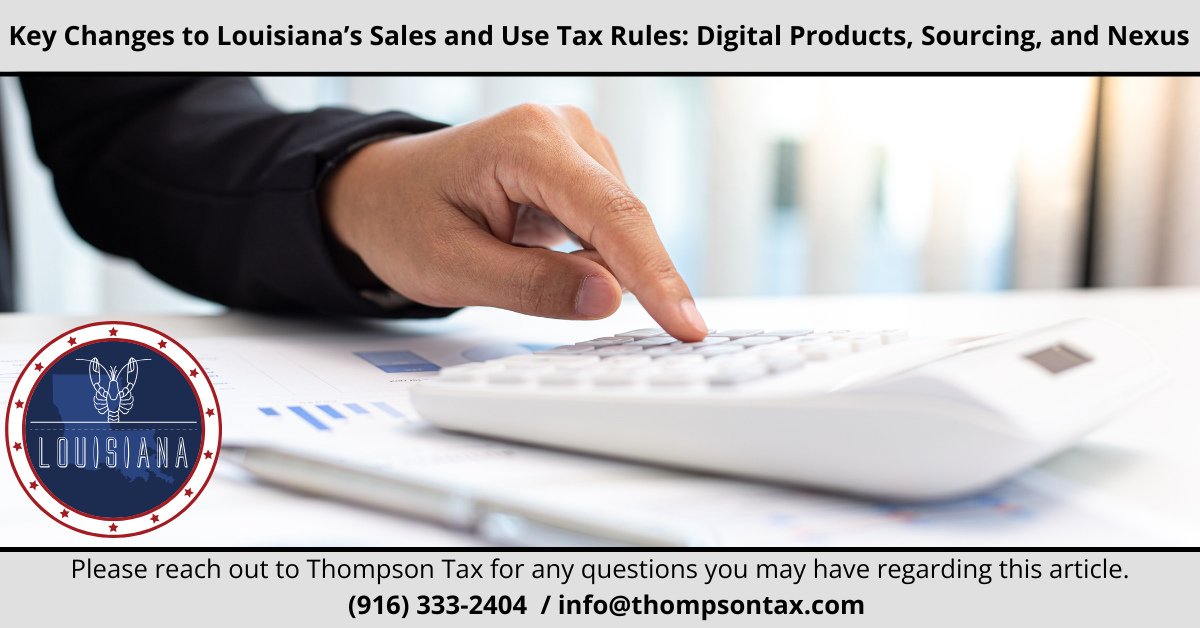
The landscape of sales and use taxes is evolving rapidly to align with the growth of digital commerce. Louisiana has joined this trend by enacting H.B. 8 and H.B. 10, which introduced two new legislative measures that became effective January 1, 2025. These laws expand the sales tax base to include digital products, implement phased changes to sales tax rates, and clarify sourcing rules and nexus guidelines. Here’s a detailed look at how these updates will affect businesses and consumers in Louisiana.
Expanding the Tax Base to Digital Products
In an era where digital goods and services are increasingly replacing their physical counterparts, Louisiana’s decision to tax digital products mirrors similar trends in other states. Beginning in 2025, sales and use tax will apply to a broad range of digital products, including:
- Digital audiovisual works such as movies, shows, and videos
- Audioworks like music, podcasts, and other audio files
- Digital books, periodicals, and discussion forums
- Digital codes, apps, and games
- Other tangible personal property delivered electronically, including software updates, maintenance, and support services
Whether consumers purchase these items outright, subscribe to them, or stream them, they will be subject to Louisiana’s sales tax.
H.B. 8 provides exemptions for digital products and software used in business and healthcare settings to offset the potential burden on key sectors. This ensures that organizations in these fields can continue operating efficiently without the burden of increased costs for essential digital tools.
For businesses outside these exemptions, the expanded tax base presents an opportunity to review their offerings and pricing strategies to remain competitive while maintaining compliance.
Sales Tax Rate Adjustments Through 2030
In addition to broadening the tax base, H.B. 10 establishes a phased adjustment to Louisiana’s sales tax rate:
- From 2025 to 2029, the rate will increase to 5%, incorporating the permanence of a previous temporary increase of 0.45% and an additional 0.55%.
- Starting in 2030, the rate will decrease slightly to 4.75%, reflecting a long-term effort to balance revenue needs with taxpayer relief.
These rate changes will directly impact businesses, especially those with large volumes of taxable transactions. Updating point-of-sale systems, accounting software, and invoicing processes to reflect the new rates will be critical. For businesses that operate across state lines, keeping Louisiana’s specific tax changes in mind will be vital for accurate compliance.
Sourcing Rules and Nexus Guidelines
H.B. 10 also addresses the complexities of taxing goods and services in a digital economy by implementing clear sourcing rules. These rules determine how and where transactions are taxed based on the purchaser’s location or the destination of the goods and services provided.
Additionally, the legislation clarifies nexus—a critical concept in determining a business’s tax obligations in a particular state. Specifically, ownership of or rights to digital products stored on servers located in Louisiana will not establish nexus. This provision is a relief for businesses that utilize cloud-based infrastructure in the state, as they won’t face unexpected tax liabilities based solely on server location.
What This Means for Businesses and Consumers
For Businesses
Compliance with these new tax laws will require businesses to:
- Update systems and processes. Tax software, point-of-sale systems, and other financial tools must be adjusted to accommodate new tax rates, expanded definitions, and sourcing rules.
- Understand exemptions. Businesses in sectors like healthcare should confirm whether they qualify for exemptions under the new rules.
- Seek expert advice. Working with tax professionals can help ensure a smooth transition and avoid costly errors.
These changes may also influence pricing strategies, customer communications, and business operations, making it essential for businesses to act proactively.
For Consumers
Consumers may notice an increase in the cost of certain digital products and services. This includes streaming subscriptions, eBooks, and previously untaxed software purchases. While these changes are unlikely to deter demand, they underscore the growing importance of digital goods in state revenue frameworks.
How Thompson Tax Can Help
Navigating tax changes can be complex, but you don’t have to face them alone. Thompson Tax is here to provide comprehensive assistance with all your sales and use tax needs. From understanding the implications of H.B. 8 and H.B. 10 to ensuring compliance with new tax rates and rules, our team of experts is dedicated to helping your business thrive.
Contact us today to stay informed, compliant, and ready for the future of sales and use tax in Louisiana. Together, we’ll ensure you’re prepared for whatever changes come next.